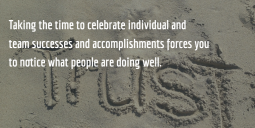How Do You Avoid Playing the Blame Game?

When my second son graduated from high school with honors we were very proud of him. When all the celebration and fanfare were over, I asked him, “If there was one thing that you could do over, what would you do differently?” He responded, “I would have ignored all the blame and criticism from my coaches and just gone out and played my game.”
How Do You Change Your Stories?

Everyone has a story. Sometimes the story we tell becomes an explanation for why we don’t achieve the results that we want. The first challenge is to notice the stories we tell. The second challenge is to change our story so that what we speak about moves us to create what we want. Changing one’s story is not easy because the best stories are true, and they usually describe things for how they currently exist. We become additionally challenged because once we see things in a particular way, we have difficulty seeing them any differently.
10 Advantages that Result from Increasing Your Emotional Intelligence

I recently gave a speech on the topic of EQ to an audience of over 1,000 people. After my presentation, I went to lunch along with the participants. Sitting at the table just behind me were two women who struck up a conversation about my presentation. I couldn’t help but eavesdrop a bit. “Look! It’s him,” one woman said
12 Ways to Connect with Millennial Employees

This summer has been a new learning experience for me.--this is the first time in a number of years where my two oldest sons returned home to work and live. I must admit that I have not been forced to relate with these two twenty-somethings for such an extended time in such close quarters.
Cues for Connecting with People from Different Generations

Recently a college professor friend of mine told me that one of his younger students would not confront him directly about the struggles that he was having with his class. However, the student did send my friend a private Twitter message that he was needing his help. He replied to the student’s tweet with a tweet of his own inviting the student to come to see him the next day at a specific time during his office hours. Only then did the student
10 Tips for Creating a Culture of Candor

When I was in college, I had a roommate who had a goal to eat a bicycle. Every evening he would take out a file and file himself a teaspoon of bike. In the morning he would place the shavings in his cereal which he ate. During the year that I lived with him, he managed to eat half of his bike.
12 Questions for Increasing Loyalty through Leadership

May 1st in the United States was Loyalty Day. It is a day when citizens acknowledge and affirm their allegiance to the country and to their heritage of American freedom. The U.S. Congress designated May 1st as Loyalty Day on July 18, 1958.
This year’s annual observance gave me cause to reflect on the loyalty that leaders and employees have to each other. One of my clients recently finished their analysis of the annual employee opinion survey and discovered that if employees had the opportunity to take another job they would do so. The survey also identified that upper management was aloof or estranged from their team members. It isn’t hard to interpret that the lack of connection among leaders and their teams or the individuals who work for them would result in various forms of discontent that would impact morale and performance. This situation seems to be even more prevalent today as more emphasis is placed on the bottom line and less on the manager-employee relationship.
How to Achieve Recognition Through Results

A friend of mine recently told me about a conversation he had with his brother, who he was coaching through some difficult times.
His brother had recently been promoted from the field into a corporate setting because of his excellent work. My friend’s brother expressed his frustration at how unimaginative his co-workers were and how they were always making mistakes. The brother went on about how unwilling everyone seemed to be about listening to his ideas or following his advice.
Healing Relationships During the Holidays

The holiday season is a wonderful time to gather with family and friends to celebrate and share time together. However, it’s all too common that when families get together, someone does or says something that offends another family member. Perhaps someone makes a comment about the poor manners of another family member’s children. Or perhaps someone comments on what ugly apparel their spouse is wearing. Maybe someone protests forcefully when another suggests an activity that everyone should go out together to do. Whatever the issue, the filters come down, people blame one another, make rude comments, and offer unwanted advice that causes other family members to take offense.
Do Your Freedoms Give You Cause to Rejoice?

I really wanted to write a piece celebrating Independence Day and the advent of freedom in our country. And yet, I have been frustrated as I have contemplated the many core American values and institutions which seem to be under attack.
Do You Lose Friends and Alienate Others? 12 Suggestions for Talking about Political Topics

Although many people have had business communications training, some still approach difficult conversations with a degree of fear and trepidation. In fact, ever since Donald Trump won the presidency, I have had a number of people call and email seeking advice and asking for suggestions about how to talk about politics. Many of these folks have done damage to their current relationships in the way that they have broached sensitive topics.
Are You Creating a Culture of Inclusion? 12 Steps for Building a More Collaborative Culture

With recent events in Ferguson, Missouri, Baltimore, Maryland, among other places around the country, and with the election of Donald Trump, people’s positions and opinions have become more and more polarized. Civil discourse and meaningful dialogue have been replaced by rancor, accusation, disrespectful language, and wild speculation unbefitting a civil and democratic society.
Are You Set to Succeed in 2017? Nine Questions to Improve Your Results

One of the greatest challenges of running the river in Grand Canyon is learning how to navigate the rapids. There is an average of one rapid every half mile from Lee’s Ferry, Arizona to Pierce Ferry on Lake Mead, Nevada, a distance of over 283 miles. In order to run these rapids successfully,
Are We Becoming Past Feeling? Eight Ways to Bring More Light to Your Holiday Season

As the year comes to an end, I have become increasingly disturbed at some of the behavior that we have witnessed this year. How can we justify a person driving their car into a group of innocent bystanders? Or a group of young boys lighting a handicapped boy on fire because he was different? Or when was it ever appropriate to burn and destroy the property of others as a way of expressing disagreement? Can we judge others based solely on opinion in the absence of concrete evidence?
How to Know if You are a Fake Talker (Part 3)

Earlier in the year, I identified 14 fake talk tactics (Part 1; Part 2) that people often employ that don’t improve the quality of our conversations. These were helpful in identifying a fake talker. Because some of you have repeatedly asked me for other examples, I have identified another set of behaviors that keep us from talking about what matters most.
















